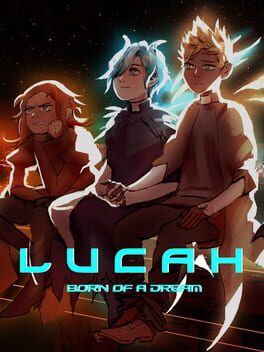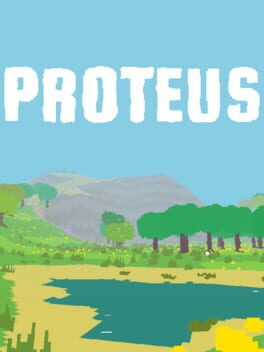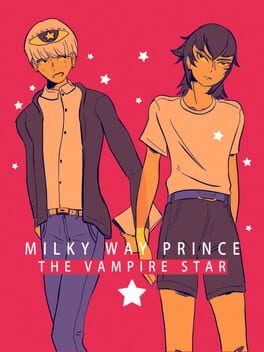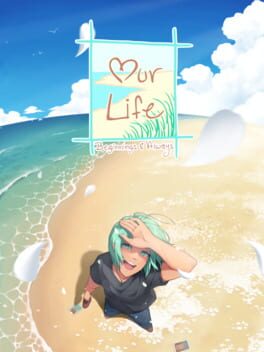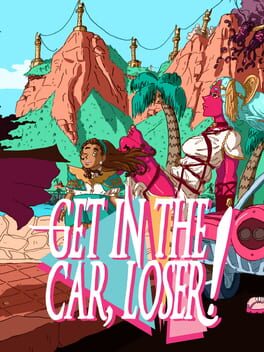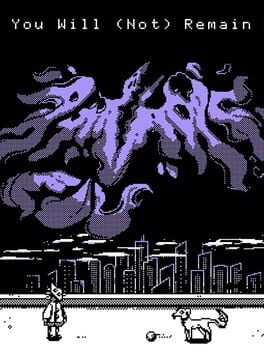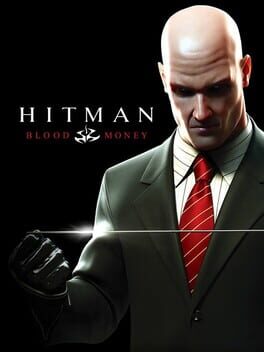kaprikornus
257 Reviews liked by kaprikornus
Put in simplest terms, Lucah: Born of a Dream is an action RPG in which you'll find fast paced combat akin to Hyper Light Drifter and design decisions that take a lot of inspiration from soulslikes; the game's world is full of bonfire equivalents scattered across its levels that respawn enemies and refill your limited health resource whenever you rest at one. However, what makes Lucah interesting is not the similarities it shares with other games, but in how it differs. While a very mechanically tight and satisfying to play game, it is also very willing to make decisions that are simply uncommon to see in video games. It's this willingness to make surprising decisions where its greatest strengths lie, and the first one of these decisions that you'll notice is the art.
Although Lucah's art is comprised of pixel art (as one would expect from a small indie game), it rejects having a clean pixel art aesthetic designed to get people who've played dozens of similarly clean looking indie games interested in it. Instead, it is often sharp, jagged, and sometimes even monotonous to look at. Many of the games areas are comprised of rough white shapes that occasionally only loosely represent the environments they're supposed to convey, all plastered over a pure black background. In some of the more empty looking areas of the game, the art can blend into itself from room to room, and can create the feeling of making no progress at all – contributing to an uneasy atmosphere that the game's eerie music and the strange red beasts known as nightmares that you encounter throughout help create.
That's not to say that Lucah isn't a great looking game. When it chooses to be it can be quite visually striking, and it often does choose to; in fact it's one of the best looking games I've ever played in my opinion. From the way the bright red nightmares stain the black and white environments they roam, to gorgeous skylines created out of a simple gradient and a few sketches of clouds, Lucah is regularly beautiful to look at. But there's definitely a willingness to forgo making something with a marketable art style in favor of creating an uneasy and somewhat lifeless tone that follows you throughout the game. And it is a fantastic decision that pairs well with the game's bleak story.
The story, same as the art, resists being simple and straightforward. Although there's recurring characters throughout, and one can glean with a decent amount of certainty a few bits of their stories here and there, the game mostly exists in the realm of metaphors and repeating themes. It is fairly safe to say that the game is partially about queer kids who have suffered deeply from growing up under some stifling and unaccepting christian religion, and suicidal thoughts come up with some regularity as the final expression of the guilt that growing up being told that your very nature is wrong instills in a person. Beyond those themes though, the game is mostly left open for interpretation – in a way that is both deeply interesting and often adds to the upsetting nature of what the story is about.
It is even unclear whether the events that take place in the game are meant to be taken as the reality of what is happening to its characters, or simply a fantastical retelling of their lives. The game deploys this dreamlike quality of its story well though, giving you just enough of a picture of what has happened to its characters to encourage you to interpret what is left up to the imagination. This vague story is often portrayed through bold white text on top of the same black background that serves as the backdrop of the game, the raw emotion of its characters shown clearly but divorced from explicit details of what is going on, with occasional flashes of art that is (often abstract) depictions of what is happening. All of this combined to make a story that I found hard to get out of my head even when not playing the game, and a sense of mystery about what was taking place in it that made the rare moments when the game peels back the curtain just enough to give you a more concrete idea of what has caused all the pain its characters feel hit hard.
In its gameplay mechanics is where Lucah most feels like it is playing it safe and building its ideas off of other games. As you explore the world you'll go from one of the games bonfire equivalents to another where you can save, level up, and in true dark souls fashion both refresh the limited uses of your health resource and respawn all the non-boss enemies in the game. Adding to the tension as you try to make your way to the next bonfire to regain your health, is regular and often unavoidable combat.
Combat in Lucah consists of a mix of melee and ranged abilities. The ranged abilities available in the game that can be used without entering an attack animation that leaves you vulnerable cost a resource called charge, which you gain by hitting enemies with regular melee attacks. Meanwhile, regular melee attacks cost stamina, which you regain over time when not executing moves that cost stamina (performing regular attacks, dodging and running). In combination these two mechanics give the game's combat a rhythm of running in to hit enemies and then, once you're low on stamina, focusing on defense and pelting enemies from whatever distance you can maintain between you and them with ranged abilities while your stamina builds back up. It's quite a lot of fun to try and maintain the two resources of stamina and charge and keep up the flow of combat. That said, the combat might be at its most fun when your game plan all falls apart in a fight and the rhythm is totally lost: when you find yourself stuck desperately trying to avoid enemy attacks until you can execute a perfect dodge that leaves an enemy vulnerable or perform a parry that stops an enemy in its track – thus resetting the momentum of combat and allowing you to regain the rhythm of managing stamina and charge. That feeling of getting back on track is perhaps even more satisfying than perfectly getting through a combat encounter.
As you near the end of the story, which you'll need to play a much harder version of the game in new game+ to see all of, you'll find that the difficulty of the game's combat vastly increases and it can become a bit of a frustrating endurance test. And it's at this point in a new game+ playthrough that even in its gameplay Lucah begins to slightly strain against the norms of game design. Difficulty spikes leading to frustration are nothing rare in games, but Lucah's efforts to frustrate you begin to feel almost like an intentional dare. It's as if the game is asking you if you're willing to grind resources and struggle through increasingly hard fights with enemies that soak up a lot of damage – all because it wants you to earn beating the game, so that when it congratulates you for doing so and offers a reward through the fantastic end to its story, its praise won't feel hollow.
If Lucah really is trying to deliberately frustrate in its last couple of hours, is it a good choice? Much like the rest of its somewhat uncommon decisions, I'd say yes. The strange world depicted so uniquely through its art, the vague and compelling story that slowly builds throughout the game, and its fantastic combat – all these elements make a game well worth playing. And when, finally, Lucah challenges you to struggle to complete it if you can, those same elements make a game well worth seeing through to the end and the difficulty in doing so satisfying once overcome.
Although Lucah's art is comprised of pixel art (as one would expect from a small indie game), it rejects having a clean pixel art aesthetic designed to get people who've played dozens of similarly clean looking indie games interested in it. Instead, it is often sharp, jagged, and sometimes even monotonous to look at. Many of the games areas are comprised of rough white shapes that occasionally only loosely represent the environments they're supposed to convey, all plastered over a pure black background. In some of the more empty looking areas of the game, the art can blend into itself from room to room, and can create the feeling of making no progress at all – contributing to an uneasy atmosphere that the game's eerie music and the strange red beasts known as nightmares that you encounter throughout help create.
That's not to say that Lucah isn't a great looking game. When it chooses to be it can be quite visually striking, and it often does choose to; in fact it's one of the best looking games I've ever played in my opinion. From the way the bright red nightmares stain the black and white environments they roam, to gorgeous skylines created out of a simple gradient and a few sketches of clouds, Lucah is regularly beautiful to look at. But there's definitely a willingness to forgo making something with a marketable art style in favor of creating an uneasy and somewhat lifeless tone that follows you throughout the game. And it is a fantastic decision that pairs well with the game's bleak story.
The story, same as the art, resists being simple and straightforward. Although there's recurring characters throughout, and one can glean with a decent amount of certainty a few bits of their stories here and there, the game mostly exists in the realm of metaphors and repeating themes. It is fairly safe to say that the game is partially about queer kids who have suffered deeply from growing up under some stifling and unaccepting christian religion, and suicidal thoughts come up with some regularity as the final expression of the guilt that growing up being told that your very nature is wrong instills in a person. Beyond those themes though, the game is mostly left open for interpretation – in a way that is both deeply interesting and often adds to the upsetting nature of what the story is about.
It is even unclear whether the events that take place in the game are meant to be taken as the reality of what is happening to its characters, or simply a fantastical retelling of their lives. The game deploys this dreamlike quality of its story well though, giving you just enough of a picture of what has happened to its characters to encourage you to interpret what is left up to the imagination. This vague story is often portrayed through bold white text on top of the same black background that serves as the backdrop of the game, the raw emotion of its characters shown clearly but divorced from explicit details of what is going on, with occasional flashes of art that is (often abstract) depictions of what is happening. All of this combined to make a story that I found hard to get out of my head even when not playing the game, and a sense of mystery about what was taking place in it that made the rare moments when the game peels back the curtain just enough to give you a more concrete idea of what has caused all the pain its characters feel hit hard.
In its gameplay mechanics is where Lucah most feels like it is playing it safe and building its ideas off of other games. As you explore the world you'll go from one of the games bonfire equivalents to another where you can save, level up, and in true dark souls fashion both refresh the limited uses of your health resource and respawn all the non-boss enemies in the game. Adding to the tension as you try to make your way to the next bonfire to regain your health, is regular and often unavoidable combat.
Combat in Lucah consists of a mix of melee and ranged abilities. The ranged abilities available in the game that can be used without entering an attack animation that leaves you vulnerable cost a resource called charge, which you gain by hitting enemies with regular melee attacks. Meanwhile, regular melee attacks cost stamina, which you regain over time when not executing moves that cost stamina (performing regular attacks, dodging and running). In combination these two mechanics give the game's combat a rhythm of running in to hit enemies and then, once you're low on stamina, focusing on defense and pelting enemies from whatever distance you can maintain between you and them with ranged abilities while your stamina builds back up. It's quite a lot of fun to try and maintain the two resources of stamina and charge and keep up the flow of combat. That said, the combat might be at its most fun when your game plan all falls apart in a fight and the rhythm is totally lost: when you find yourself stuck desperately trying to avoid enemy attacks until you can execute a perfect dodge that leaves an enemy vulnerable or perform a parry that stops an enemy in its track – thus resetting the momentum of combat and allowing you to regain the rhythm of managing stamina and charge. That feeling of getting back on track is perhaps even more satisfying than perfectly getting through a combat encounter.
As you near the end of the story, which you'll need to play a much harder version of the game in new game+ to see all of, you'll find that the difficulty of the game's combat vastly increases and it can become a bit of a frustrating endurance test. And it's at this point in a new game+ playthrough that even in its gameplay Lucah begins to slightly strain against the norms of game design. Difficulty spikes leading to frustration are nothing rare in games, but Lucah's efforts to frustrate you begin to feel almost like an intentional dare. It's as if the game is asking you if you're willing to grind resources and struggle through increasingly hard fights with enemies that soak up a lot of damage – all because it wants you to earn beating the game, so that when it congratulates you for doing so and offers a reward through the fantastic end to its story, its praise won't feel hollow.
If Lucah really is trying to deliberately frustrate in its last couple of hours, is it a good choice? Much like the rest of its somewhat uncommon decisions, I'd say yes. The strange world depicted so uniquely through its art, the vague and compelling story that slowly builds throughout the game, and its fantastic combat – all these elements make a game well worth playing. And when, finally, Lucah challenges you to struggle to complete it if you can, those same elements make a game well worth seeing through to the end and the difficulty in doing so satisfying once overcome.
Proteus
2013
Interesting that this is referred to as a walking simulator when it almost feels more like a consciousness simulator, i.e that most "walking simulators" such as Gone Home, Death Stranding, Dear Esther, etc are concerned with conveying a certain physicality within the depicted space (footstep sounds, walking animations) while in Proteus you simply glide through the island, the sense of drift feeling like an out-of-body experience. Reminds me of the sort of waking dream state you fall into while tripping, though Proteus is a much less absorbing experience than that. Visually and aurally very nice though.
Act I is good vibes: the videogame. That doesn’t mean that it lacks claws, it’s about a journey against obvious fascist, homophobe, transphobe and related figures and ideologies. The game doesn’t even try to hide who is fighting against, and it’s the right call, it would be a bit of a step down to look for some supposed “subtlety” in a game that yearns for justice, or at least the fantasy of it. What’s good is that, having clear who is the enemy, the group just goes by, drive and kick ass, chilling. Realizing on the car that a mysterious godly giant bird is following them and insulting it just in case that it is omnipresent, finishing every combat with a postal card goofy photo, turning the whole screen pink as Grace prepares freezed while “I WON’T FALTER IN THE FACE OF EVIL” is written on giant scratched letters across the screen when the Sword of Fate is used, the escape combat option asking you if you want to “escape to fight another day”, the result screen after escaping telling you that “the only reward for running from a fight is survival”... Even the too repetitive combats get a pass by being mostly avoidable (not exactly a compliment, I know) and being very active, without pauses.
This energy is lost entering act II onwards. The now not tutorialized combat shows that it doesn't take off, worsened by an even more insisting encounter pace. The little cute details get caught too in repetition and lose their significance soon. Probably the worst one, the carefree talk on the road is now drained by thoughts about how the villains view them, when not the villains doing the monologues themselves, what before asked to be responded with a fist in the mouth now takes its time to fade away the charm. But this does come to some sense.
If I don’t care about any lack of subtlety is because one of the things I appreciate the most, in general, is honesty. Not that being honest is always enough, but I feel that I need some of it if only to be on the basis. Act III, the more direct one, takes the hateful villain ideas and explores how it affects Sam along the way in full introspection. An exploration that is clunky, not only for the still present combat, now being more disruptive than before, but also the constant humor not being in place at all and the overall presentation forgetting about the senses. Yet, I appreciate the pause to explore the doubts and fears of a queer hero, insecurities that for sure have been discussed way too many times before and probably better, and still a sincere action above all. If this queer battle wants to take any chance to win it must fight nihilism as well. Against the “nothing really matters”, care about the individual. Random people posting online that you should not exist and the likes are interesting subjects to care about as evident or small as they may seem, after all, those thoughts do come from somewhere real, and that's the frightening part. Is this confession then enough in spite of everything? Ironically, to be honest, I understand the soul, but I don't feel it as much.
This energy is lost entering act II onwards. The now not tutorialized combat shows that it doesn't take off, worsened by an even more insisting encounter pace. The little cute details get caught too in repetition and lose their significance soon. Probably the worst one, the carefree talk on the road is now drained by thoughts about how the villains view them, when not the villains doing the monologues themselves, what before asked to be responded with a fist in the mouth now takes its time to fade away the charm. But this does come to some sense.
If I don’t care about any lack of subtlety is because one of the things I appreciate the most, in general, is honesty. Not that being honest is always enough, but I feel that I need some of it if only to be on the basis. Act III, the more direct one, takes the hateful villain ideas and explores how it affects Sam along the way in full introspection. An exploration that is clunky, not only for the still present combat, now being more disruptive than before, but also the constant humor not being in place at all and the overall presentation forgetting about the senses. Yet, I appreciate the pause to explore the doubts and fears of a queer hero, insecurities that for sure have been discussed way too many times before and probably better, and still a sincere action above all. If this queer battle wants to take any chance to win it must fight nihilism as well. Against the “nothing really matters”, care about the individual. Random people posting online that you should not exist and the likes are interesting subjects to care about as evident or small as they may seem, after all, those thoughts do come from somewhere real, and that's the frightening part. Is this confession then enough in spite of everything? Ironically, to be honest, I understand the soul, but I don't feel it as much.
Fallout: New Vegas
2010
Buggy fucking mess but if you manage to get it into a playable state you'll have a fantastic time. One of my favorite Western (both regionally and thematically) RPGs I've played thus far. Obsidian takes and refines the gameplay system from Fallout 3 and wipes away the shitty writing and replaces it with actually GOOD RPG elements and you have a classic in your hands.
Fallout: New Vegas
2010
Fallout: New Vegas is, to me, definitively the best RPG ever made. And it isn't close.
The Fallout franchise has a long and storied history that bares repeating for the sake of context. Fallout: A Post-Nuclear Role-Playing Game was created by Black Isle Studios in 1997 as an isometric, tactical CRPG. The point-and-click, turn-based game was one of the first games to rely on clever dialogue and branching quest lines and while not very popular, set a new standard for these niche types of games. Just a year later Fallout 2 was released, using the same engine and graphics as the first game.
Interplay, the publisher, rented out the license to external studios to create two poorly received spin-offs, Fallout Tactics and Fallout: Brotherhood of Steel. These games attempted to spin the license into a pure overhead tactics game and an action game, but with their failure Interplay shut the franchise down and sold the near-useless Fallout IP to Bethesda Softworks. The rest, as they say, is history; Fallout is now one of the biggest gaming franchises on earth. Fallout 3 was 2008’s definitive Game of the Year. Fallout 4, despite disappointing a lot of fans, is one of the best-selling RPGs of all time, topping Bethesda’s own Skyrim and sitting second only to the juggernaut that is Pokemon. While Fallout 76 holds the esteemed title of “worst launch of all time,” the Wastelanders update has made the game playable and even pretty good. Essentially, Fallout games have a history of being all over the place.
Nestled comfortably in this complicated release history is 2010’s Fallout: New Vegas. Following the success of Fallout 3, Bethesda rented out the Fallout IP to a new studio called Obsidian Entertainment, made up of the very ex-Black Isle Studios employees that had created Fallout in the first place. Bethesda handed Obsidian the Fallout 3 engine and put them to work — and so it was that the planets aligned. All the best parts of the classic Fallout games and the Bethesda version came together to form Fallout: New Vegas, one of the greatest RPGs (and dare I say greatest games) of all time.
A quick cut scene establishes the world of Fallout: war between the US and China escalated in the year 2077 to the point of total atomic annihilation around the world. The bombs dropped and ended humanity as we know it, leaving the survivors to scrounge for food in a horrific wasteland. The Forced Evolutionary Virus escaped containment, transforming everything from scorpions to lizards to humans into grotesque mutants. Over a hundred years later, a courier travels through the Mojave desert to deliver a package. The Courier is stopped by Benny, played by Matthew Perry (Chandler from Friends), and is shot in the head when they refuse to give up the goods.
The player wakes up in the run-down home of one Doc Mitchell, a kindly old man who explains the situation and acquaints the Courier with the state of the world. He then guides you through a clever set of questions in a psych test to determine your optimal character build, but you can of course set your stats however you’d like. After point-buying from your seven S.P.E.C.I.A.L. stats (Strength, Perception, Endurance, Charisma, Intelligence, Agility, Luck), you’ll select a few special skills for your character to have. You design your character in a subpar character creator (but hey, it was 2010) and then it’s off to the wasteland!
New Vegas was the first Fallout game I ever played, and I had no idea what the series was about before that. More than that, though, this was the first open world game I had ever played. And the first western RPG I’d ever played as well. This was all new to me, every piece of it. New Vegas eases new players in to the post-apocalypse by introducing a compelling cast of characters in Goodsprings, the starting town, and having them drip-feed you exposition through well-written dialogue. Sunny Smiles and her dog Cheyenne walk the Courier through the basics of shooting, VATS, item management and exploration if they choose; if the player is a veteran, they can simply exit Doc Mitchell’s house and begin wandering the waste in literally any direction they choose. New Vegas does a near-perfect job teaching new players how to learn about the wasteland themselves, rather than dumping exposition and calling it a day.
The premise of the story is that you, the Courier, were delivering something called the Platinum Chip to the mysterious owner of New Vegas, Mr. House. After being shot in the head the Courier has lost their memory, and remembers only Benny’s smug face as he pulled the trigger. You’ll set out from Goodsprings to track down Chandler and get the full story out of him, dead or alive. Meanwhile, a war is brewing; two huge armies are moving slowly towards the coveted Hoover Dam, the biggest source of power in the Mojave.
The New California Republic is the remnants of the governments of six West Coast States that formed a new union upon the destruction of the United States, while Caesar’s Legion is a tribe of barbarian sex-traffickers marching from the midwest, believing they are the chosen army to achieve the glory of Rome. This is to say nothing of the aforementioned Mr. House, sitting pretty in control of New Vegas and all the food, water, electricity, drugs and luxuries that come with it. The underground militia of The Brotherhood of Steel sits quietly in the dunes waiting for their moment while the drug-pushing Great Khans stake their claim in the deserts. The Boomers have taken control of an old Air Force base up north and claimed the weapons, but there are rumors that the husk of the American Government has formed once more into the Enclave. Each and every one of these factions have a relationship with the others, and your actions determines who allies together, who betrays each other and who ultimately is victorious.
It is almost impossible to understand the moving pieces of the world as they change around you in response to your decisions. Shooting one person at the wrong time could have ramifications that reach across the deserts and through to the end of the game. Dialogue choices become available to different players depending on how they’ve statted their character, so it’s unlikely any two people have played Fallout New Vegas exactly the same way. Dialogue is more clever than it has any right to be all the way through to the end of the game, and your dialogue choices can have very immediate ramifications if you say the wrong thing. A pleasant chat can become a shootout in a matter of seconds, but hey, that’s the wasteland, baby.
The shooting in Fallout New Vegas is not good. It does improve upon its predecessor, Fallout 3, by offering a much larger assortment of guns; however, the feel of gunplay has not improved. Guns continue to be hard to aim, and moving targets are almost impossible to hit without using VATS (the lock on mechanism). There are many action RPGs in which players will try to power through the dialogue sections to reach the action, however players will likely find the reverse true in New Vegas. Utilizing the correct weapons, armor, chems and skills will give you the edge in individual fights, but the overall war will be decided by how well you can play your character, whether its a max-strength barbarian or a lucky sonofabitch. The RPG mechanics of this game are deeper than most will care to dive into, but rest assured they are there.
The companions in New Vegas are for the most part well written, interesting people that have discernible goals and will join the Courier if they believe it’ll help them reach those goals. Cass, Boone, ED-E and of course our very good boy Rex are just a few of the great characters that will accompany you, each with their own specific set of powers and skills. Dialogue and interactions with other characters will change depending on who your companion is, but be wary that they’re also keeping an eye on you. If the Courier makes too many decisions in favor of a faction they’re not aligned with, the companion will leave your party or even try to kill you. If you’re trying for a Legion playthrough, I’d advise you to assassinate Boone as quickly as possible.
Fallout New Vegas takes everything that Fallout 3 brought to the series stretches it over the skeleton of the classic games, creating something much more elegant than it has any right to be. Aside from the numerous technical problems and impossible-to-aim guns, Fallout New Vegas is a flawless masterpiece. The player will continue to be astounded that the developers thought of one thing or another and prepared for it; your choices in both dialogue and action do truly affect and alter the world around you. And endless cast of well-written characters with overwritten backstories will carry the Courier through the wastes in search of the truth and land them in a very specific position to determine how the war plays out. Although the player is always in control, most repercussions of your actions are completely unintended and leave you scrambling to figure out how to repair an alliance or take a stronghold to remedy it. Obsidian has created the most intricately crafted game ever written with excellent DLC and well over a hundred hours of content — and I didn’t even touch on mods. Get it.
The Fallout franchise has a long and storied history that bares repeating for the sake of context. Fallout: A Post-Nuclear Role-Playing Game was created by Black Isle Studios in 1997 as an isometric, tactical CRPG. The point-and-click, turn-based game was one of the first games to rely on clever dialogue and branching quest lines and while not very popular, set a new standard for these niche types of games. Just a year later Fallout 2 was released, using the same engine and graphics as the first game.
Interplay, the publisher, rented out the license to external studios to create two poorly received spin-offs, Fallout Tactics and Fallout: Brotherhood of Steel. These games attempted to spin the license into a pure overhead tactics game and an action game, but with their failure Interplay shut the franchise down and sold the near-useless Fallout IP to Bethesda Softworks. The rest, as they say, is history; Fallout is now one of the biggest gaming franchises on earth. Fallout 3 was 2008’s definitive Game of the Year. Fallout 4, despite disappointing a lot of fans, is one of the best-selling RPGs of all time, topping Bethesda’s own Skyrim and sitting second only to the juggernaut that is Pokemon. While Fallout 76 holds the esteemed title of “worst launch of all time,” the Wastelanders update has made the game playable and even pretty good. Essentially, Fallout games have a history of being all over the place.
Nestled comfortably in this complicated release history is 2010’s Fallout: New Vegas. Following the success of Fallout 3, Bethesda rented out the Fallout IP to a new studio called Obsidian Entertainment, made up of the very ex-Black Isle Studios employees that had created Fallout in the first place. Bethesda handed Obsidian the Fallout 3 engine and put them to work — and so it was that the planets aligned. All the best parts of the classic Fallout games and the Bethesda version came together to form Fallout: New Vegas, one of the greatest RPGs (and dare I say greatest games) of all time.
A quick cut scene establishes the world of Fallout: war between the US and China escalated in the year 2077 to the point of total atomic annihilation around the world. The bombs dropped and ended humanity as we know it, leaving the survivors to scrounge for food in a horrific wasteland. The Forced Evolutionary Virus escaped containment, transforming everything from scorpions to lizards to humans into grotesque mutants. Over a hundred years later, a courier travels through the Mojave desert to deliver a package. The Courier is stopped by Benny, played by Matthew Perry (Chandler from Friends), and is shot in the head when they refuse to give up the goods.
The player wakes up in the run-down home of one Doc Mitchell, a kindly old man who explains the situation and acquaints the Courier with the state of the world. He then guides you through a clever set of questions in a psych test to determine your optimal character build, but you can of course set your stats however you’d like. After point-buying from your seven S.P.E.C.I.A.L. stats (Strength, Perception, Endurance, Charisma, Intelligence, Agility, Luck), you’ll select a few special skills for your character to have. You design your character in a subpar character creator (but hey, it was 2010) and then it’s off to the wasteland!
New Vegas was the first Fallout game I ever played, and I had no idea what the series was about before that. More than that, though, this was the first open world game I had ever played. And the first western RPG I’d ever played as well. This was all new to me, every piece of it. New Vegas eases new players in to the post-apocalypse by introducing a compelling cast of characters in Goodsprings, the starting town, and having them drip-feed you exposition through well-written dialogue. Sunny Smiles and her dog Cheyenne walk the Courier through the basics of shooting, VATS, item management and exploration if they choose; if the player is a veteran, they can simply exit Doc Mitchell’s house and begin wandering the waste in literally any direction they choose. New Vegas does a near-perfect job teaching new players how to learn about the wasteland themselves, rather than dumping exposition and calling it a day.
The premise of the story is that you, the Courier, were delivering something called the Platinum Chip to the mysterious owner of New Vegas, Mr. House. After being shot in the head the Courier has lost their memory, and remembers only Benny’s smug face as he pulled the trigger. You’ll set out from Goodsprings to track down Chandler and get the full story out of him, dead or alive. Meanwhile, a war is brewing; two huge armies are moving slowly towards the coveted Hoover Dam, the biggest source of power in the Mojave.
The New California Republic is the remnants of the governments of six West Coast States that formed a new union upon the destruction of the United States, while Caesar’s Legion is a tribe of barbarian sex-traffickers marching from the midwest, believing they are the chosen army to achieve the glory of Rome. This is to say nothing of the aforementioned Mr. House, sitting pretty in control of New Vegas and all the food, water, electricity, drugs and luxuries that come with it. The underground militia of The Brotherhood of Steel sits quietly in the dunes waiting for their moment while the drug-pushing Great Khans stake their claim in the deserts. The Boomers have taken control of an old Air Force base up north and claimed the weapons, but there are rumors that the husk of the American Government has formed once more into the Enclave. Each and every one of these factions have a relationship with the others, and your actions determines who allies together, who betrays each other and who ultimately is victorious.
It is almost impossible to understand the moving pieces of the world as they change around you in response to your decisions. Shooting one person at the wrong time could have ramifications that reach across the deserts and through to the end of the game. Dialogue choices become available to different players depending on how they’ve statted their character, so it’s unlikely any two people have played Fallout New Vegas exactly the same way. Dialogue is more clever than it has any right to be all the way through to the end of the game, and your dialogue choices can have very immediate ramifications if you say the wrong thing. A pleasant chat can become a shootout in a matter of seconds, but hey, that’s the wasteland, baby.
The shooting in Fallout New Vegas is not good. It does improve upon its predecessor, Fallout 3, by offering a much larger assortment of guns; however, the feel of gunplay has not improved. Guns continue to be hard to aim, and moving targets are almost impossible to hit without using VATS (the lock on mechanism). There are many action RPGs in which players will try to power through the dialogue sections to reach the action, however players will likely find the reverse true in New Vegas. Utilizing the correct weapons, armor, chems and skills will give you the edge in individual fights, but the overall war will be decided by how well you can play your character, whether its a max-strength barbarian or a lucky sonofabitch. The RPG mechanics of this game are deeper than most will care to dive into, but rest assured they are there.
The companions in New Vegas are for the most part well written, interesting people that have discernible goals and will join the Courier if they believe it’ll help them reach those goals. Cass, Boone, ED-E and of course our very good boy Rex are just a few of the great characters that will accompany you, each with their own specific set of powers and skills. Dialogue and interactions with other characters will change depending on who your companion is, but be wary that they’re also keeping an eye on you. If the Courier makes too many decisions in favor of a faction they’re not aligned with, the companion will leave your party or even try to kill you. If you’re trying for a Legion playthrough, I’d advise you to assassinate Boone as quickly as possible.
Fallout New Vegas takes everything that Fallout 3 brought to the series stretches it over the skeleton of the classic games, creating something much more elegant than it has any right to be. Aside from the numerous technical problems and impossible-to-aim guns, Fallout New Vegas is a flawless masterpiece. The player will continue to be astounded that the developers thought of one thing or another and prepared for it; your choices in both dialogue and action do truly affect and alter the world around you. And endless cast of well-written characters with overwritten backstories will carry the Courier through the wastes in search of the truth and land them in a very specific position to determine how the war plays out. Although the player is always in control, most repercussions of your actions are completely unintended and leave you scrambling to figure out how to repair an alliance or take a stronghold to remedy it. Obsidian has created the most intricately crafted game ever written with excellent DLC and well over a hundred hours of content — and I didn’t even touch on mods. Get it.
